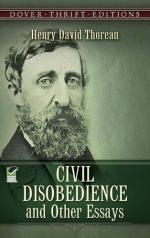|
This section contains 453 words (approx. 2 pages at 400 words per page) |

|
Civil Disobedience, and Other Essays Summary & Study Guide Description
Civil Disobedience, and Other Essays Summary & Study Guide includes comprehensive information and analysis to help you understand the book. This study guide contains the following sections:
This detailed literature summary also contains Topics for Discussion and a Free Quiz on Civil Disobedience, and Other Essays by Henry David Thoreau.
"Civil Obedience and Other Essays" contains five of Thoreau's most frequently published essays outlining his unique principles on the role of man in society and his proper relationship to his government, his fellow man, and to nature.
The first essay in the book, entitled "Civil Disobedience" is a call by Thoreau for people to take responsibility for the actions of the government their taxes support. He is writing specifically about the government of Massachusetts, which while outlawing slavery had recently allowed for the return of escaped slaves to their owners in the South. Men have a moral responsibility to withhold support of a government engaged in immoral actions, Thoreau claims. He writes the essay after he himself is jailed for a short time for refusing to pay a poll tax.
In "Slavery in Massachusetts," Thoreau returns to his criticism of the Massachusetts government for supporting the return of fugitive slaves to their southern owners. He attacks the laws of the state as not being based on truth, and again calls for just men to resist them. An unjust government is truly harmful to its subjects, he argues. Thoreau also criticizes popular newspapers for their treatment of the issue, saying they all miss the real issue, which is one of morality.
In "A Plea for Captain John Brown," Thoreau praises the violent actions of the leader of a raid on the federal arsenal at Harper's Ferry who is condemned to death for his actions, which were intended to bring on a slave revolt and the end of slavery. Thoreau compares Brown to Christ and argues that his death may be the impetus needed to finally end slavery in the US.
"Walking" is a description of the joy Thoreau finds in hiking through natural, unspoiled areas. In this essay, Thoreau outlines what he feels is the proper relationship between society and nature. Men should not spend their time draining swamps and trying to improve the land, he argues. By doing so they subvert their relationship with nature. Improved properties lead to towns and cities, he implies, which lead to an even further separation from nature. In the expansion of the young US toward the West, Thoreau sees a desire for men to return to nature and the wilderness.
In "Life Without Principle," Thoreau condemns the idle pursuit of money and riches at the expense of being true to one's own calling. People who work only for money, or go prospecting for gold, will never learn to truly sustain themselves, he argues. He criticizes newspapers and their influence, and the shallow interactions that most members of society engage in. Thoreau advocates removing oneself from these activities to become truly self-sufficient and happy.
Read more from the Study Guide
|
This section contains 453 words (approx. 2 pages at 400 words per page) |

|



